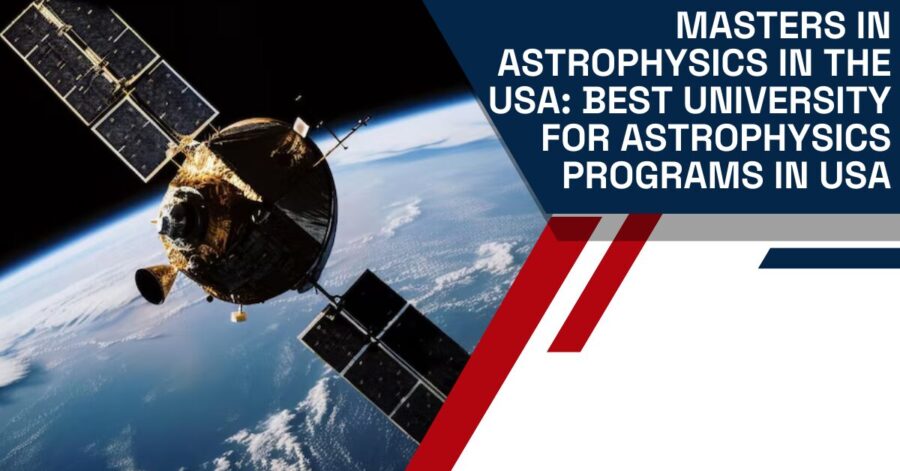18 September 2024
8 minutes read
Masters in Astrophysics in the USA: Best University for Astrophysics Programs in USA

Key Takeaways
- Top U.S. universities offer stellar astrophysics programs with cutting-edge research facilities and diverse specializations.
- The application process is competitive but manageable with proper preparation and a strong academic background.
- Various financial aid options are available, from federal grants to field-specific scholarships, to support your cosmic pursuits.
- Life as an international student in the U.S. offers rich cultural experiences and opportunities for personal and professional growth.
“The cosmos is within us. We are made of star-stuff. We are a way for the universe to know itself.” – Carl Sagan
Pursuing a Masters in Astrophysics USA can feel like navigating a black hole. The field is competitive, programs are limited, and the coursework is notoriously challenging. Many aspiring astrophysicists find themselves overwhelmed by the application process, unsure of how to stand out in a sea of brilliant minds.
But don’t let these challenges eclipse your dreams. With the right approach, you can chart a course to success. Start by identifying programs that align with your research interests and career goals. Reach out to current students and faculty to get insider perspectives. And remember, your unique experiences and passion for the cosmos are your greatest assets in this journey.
Benefits of Studying Astrophysics in the USA

Choosing to study astrophysics in the USA opens up a universe of opportunities. From access to state-of-the-art observatories to collaborations with NASA, the advantages are as vast as the cosmos itself.
- Networking opportunities with world-renowned faculty.
- Access to advanced research facilities and technology.
- A diverse academic community fostering critical thinking.
- Excellent career prospects in academia, research, and space exploration.
Astrophysics is a bridge between the vastness of the universe and the minutiae of subatomic particles.
– Neil deGrasse Tyson, Astrophysicist
Top USA Universities for Astrophysics
When it comes to unraveling the mysteries of the cosmos, these American institutions stand at the forefront. Let’s explore the universities that offer stellar astrophysics programs, blending cutting-edge research with world-class faculty.
| University | Program Highlights | Research Facilities | Specializations |
|---|---|---|---|
| Harvard University | Renowned faculty, cutting-edge research | Harvard-Smithsonian Center for Astrophysics, Harvard College Observatory | Astrophysical theory, observational astrophysics, and more |
| Stanford University | Strong focus on space sciences, extensive courses | Stanford Observatory, Kavli Institute for Particle Astrophysics and Cosmology | Stellar and planetary systems, galaxy formation, and more |
| Massachusetts Institute of Technology (MIT) | Advanced astrophysics programs, observatories | Haystack Observatory, MIT Wallace Astrophysical Observatory | Cosmology, astrophysical simulations, and more |
| Princeton University | Exceptional research opportunities, resources | Princeton Plasma Physics Laboratory, Peyton Observatory | Cosmology, theoretical astrophysics, and more |
| California Institute of Technology (Caltech) | Top observatories and telescopes, hands-on experience | Palomar Observatory, Owens Valley Radio Observatory | Star formation, high-energy astrophysics, and more |
Did You Know?
The Harvard-Smithsonian Center for Astrophysics, one of the research facilities mentioned, is a collaboration between the Smithsonian Astrophysical Observatory and the Harvard College Observatory, providing a unique environment for astrophysical research and education.
Astrophysics Programs and Specializations
Astrophysics programs in the USA offer a diverse range of specializations, allowing students to focus on specific areas of the cosmos. Many universities tailor their curricula to align with cutting-edge research and celestial discoveries.
Diverse Research Opportunities
Specializations open doors to various research paths. You might find yourself studying black holes, exploring exoplanets, or unraveling the mysteries of dark matter. This diversity ensures you can pursue your passion within the vast field of astrophysics.
Hands-on Experience with Advanced Technology
Many universities boast state-of-the-art observatories and labs. You’ll get to work with advanced telescopes and data analysis tools, gaining practical skills in observing celestial objects. This hands-on experience is invaluable for your future career.
Interdisciplinary Approach
Astrophysics often intersects with other fields like computer science and engineering. Specialized programs encourage you to think beyond traditional boundaries, fostering innovation and new perspectives in studying celestial phenomena.
Preparation for Diverse Career Paths
Whether you’re aiming for academia, industry, or space agencies, specializations equip you with targeted skills. From data science to space instrumentation, these focused studies enhance your employability across various sectors.
Contribution to Cutting-Edge Discoveries
Astrophysics programs in the USA offer a diverse range of specializations, allowing students to focus on specific areas of the cosmos. Many universities tailor their curricula to align with cutting-edge research and celestial discoveries.
Eligibility Criteria and Admission Process
Understanding the admission process for astrophysics programs can be as complex as charting a course through the cosmos. Let’s break down the key requirements and steps you’ll need to take to launch your academic journey in this fascinating field.
Eligibility Criteria
Before embarking on your astrophysical adventure, ensure you meet the eligibility requirements. Generally, universities in the USA require a bachelor’s degree in a related field, proficiency in English (TOEFL or IELTS), and competitive GRE scores. Keep an eye on application deadlines, as they may vary among institutions.
| Eligibility Criteria | Requirements |
|---|---|
| Academic Background | Bachelor’s degree in a related field (e.g., physics, astronomy, mathematics) |
| English Proficiency Tests | Proof of English language proficiency, typically TOEFL or IELTS scores |
| GRE Scores | Competitive GRE (Graduate Record Examination) scores |
| Letters of Recommendation | Usually 2-3 letters from professors or professionals in the field |
| Statement of Purpose | A well-crafted statement outlining your academic and career goals |
| Transcripts | Official transcripts from previous educational institutions |
| Application Fees | Application fees vary by university and program |
| Additional Requirements | Some universities may require subject-specific GRE tests or interviews |
Application Process
Here is a step-by-step guidance on preparing your application, including required documents and fees.
Step 1: Research Universities
Begin by researching universities in the USA that offer astrophysics programs and match your interests and goals. Here, students need to understand the difference between private and public universities in the USA here.
Step 2: Check Eligibility
Ensure you meet the eligibility criteria, which typically include a bachelor’s degree in a related field, English proficiency tests (TOEFL or IELTS), and competitive GRE scores. Some universities may have additional requirements. Also understand if you need SAT to study in USA as well.
Step 3: Select Programs
Choose the specific astrophysics program (Master’s or Ph.D.) that aligns with your career aspirations and academic background.
Step 4: Gather Documents
Collect the necessary documents, including transcripts, letters of recommendation (usually 2-3), a well-crafted statement of purpose, and proof of English proficiency.
Step 5: Prepare GRE
If required, prepare and take the GRE (Graduate Record Examination) and any subject-specific GRE tests that the university demands.
Step 6: Online Application
Complete the university’s online application form, paying attention to deadlines and any associated fees.
Step 7: Submit Transcripts
Send official transcripts from your previous educational institutions to the university’s admissions office.
Step 8: Letters of Recommendation
Arrange for your chosen recommenders to submit their letters directly to the university.
Step 9: Statement of Purpose
Write a compelling statement of purpose that outlines your academic and career goals, as well as your motivation for studying astrophysics.
Step 10: Application Fee
Pay the application fee, if applicable, following the university’s payment instructions.
Step 11: Submit Application
Carefully review your application, ensuring all required materials are included, and submit it before the application deadline.
Step 12: Interviews
Some programs may require interviews as part of the selection process. Prepare for interviews if necessary.
Step 13: Wait for Admission Decision
Wait for the university’s admission committee to review your application. This may take several weeks.
Step 14: Acceptance and Enrollment
If admitted, follow the university’s instructions for accepting the offer and enrolling in the program. Be sure to meet any visa requirements if you are an international student.
Step 15: Prepare for Your Studies
Once enrolled, make necessary preparations for your studies, including arranging accommodation and planning your course schedule
Financial Aid and Scholarships

Funding your astrophysics education doesn’t have to be a black hole for your finances. From federal grants to university-specific scholarships, there are numerous options to help you reach for the stars without breaking the bank.
| Financial Aid/Scholarship | Description | Eligibility Criteria |
|---|---|---|
| Federal Student Aid | Financial assistance from the U.S. government | U.S. citizens or eligible non-citizens |
| FAFSA (Free Application for Federal Student Aid) required | ||
| Fulbright Scholarships | International exchange program | Non-U.S. citizens pursuing degrees in the USA |
| Funded by the U.S. Department of State | Varies by country and program | |
| NASA Internships and Scholarships | Opportunities for research and funding | Eligibility criteria vary by program |
| National Science Foundation (NSF) Fellowships | Financial support for graduate students | U.S. citizens or permanent residents |
| Funded by the NSF | Pursuing research in STEM fields | |
| American Astronomical Society (AAS) Grants | Various grants for astronomy students | AAS membership may be required |
| Research, travel, and education grants | ||
| Private Scholarships | Numerous private organizations offer scholarships | Varies by the scholarship provider |
Life as an International Student in the USA
Life as an international student in the USA can be a rewarding experience. It offers the opportunity to pursue your astrophysics studies while immersing yourself in a diverse and vibrant culture. Here are some key aspects to consider when living as an international student in the USA:
Cultural Experiences
The USA is known for its diverse culture. You’ll have the chance to interact with people from various backgrounds, which can broaden your horizons and provide a unique perspective on the world. Participate in cultural events, festivals, and celebrations in your university and local community to embrace American traditions and customs.
Accommodation Options
Universities typically offer various housing options for international students, including on-campus dormitories and off-campus apartments. Explore the housing choices available at your institution and select the one that best suits your preferences and budget. Students can take a look at the cost of studying in USA for Indian students to get a better idea of the cost aspects.
Student Support Services
Most universities have dedicated international student offices or services that assist with immigration matters, cultural adjustment, and academic support. Take advantage of these resources to ease your transition to life in the USA.
Work Opportunities
International students in the USA are often eligible for on-campus employment and, in some cases, off-campus work authorization. These opportunities can help you gain practical experience and financial support. Familiarize yourself with the U.S. government’s regulations regarding work permissions for international students.
Maintaining Visa Status
It’s crucial to adhere to the terms of your student visa (F-1 or J-1). Ensure you understand the rules and responsibilities associated with your visa status, such as maintaining a full course load and reporting any changes to your designated school official (DSO). Stay informed about the latest updates and regulations related to international students in the USA.
Networking and Engagement
Join student organizations, clubs, and associations related to astrophysics or your interests. Engaging in extracurricular activities can help you build a social network and make lifelong friends. Attend academic seminars, conferences, and workshops to connect with professors, researchers, and fellow students who share your passion for astrophysics.
Healthcare and Insurance
Health insurance is essential while living in the USA. Most universities offer health insurance plans for international students. Familiarize yourself with the healthcare facilities and services available on and off campus, and know how to access medical care when needed.
Budgeting and Financial Planning
Create a budget that includes tuition, living expenses, and personal spending. Stick to your budget to ensure your financial stability during your studies. Explore opportunities for scholarships, part-time work, and financial aid to ease the financial burden of studying abroad.
Stay Informed
Keep yourself updated on immigration policies, visa regulations, and international student news. Stay in touch with your university’s international student office for guidance and support.
Travel and Exploration
The USA offers diverse landscapes and attractions. Use your free time to explore the country, from national parks to cultural hubs. Plan your trips wisely, considering your academic commitments and budget.
The cosmos is within us. We are made of star-stuff. We are a way for the universe to know itself.
– Carl Sagan, Astrophysicist and Cosmologist
Conclusion
In 2024, the USA beckons aspiring astrophysicists with its world-renowned universities and unparalleled research opportunities. Take the plunge into the cosmos and embark on an exhilarating journey of discovery. Your pursuit of the mysteries of the universe begins here.
Chart your educational course with Ambitio in the USA! Learn from the best, immerse in global experiences, and test theories in real life. Your future awaits – Study in USA.
Dive into the success stories of students who’ve secured spots in some of the most prestigious institutions in the USA. Get inspired, compare profiles, and discover what it takes to join the ranks of these top admits.
FAQs
What are the eligibility criteria for astrophysics programs in the USA?
Eligibility typically includes a bachelor’s degree in a related field, English proficiency tests (TOEFL or IELTS), and competitive GRE scores. Requirements may vary by university.
Which universities in the USA offer astrophysics programs with financial aid for international students?
Many universities offer financial aid and scholarships. Institutions like Harvard, MIT, and Stanford often provide support for international students. Check specific university websites for details.
What specializations are available in astrophysics programs?
Specializations can include cosmology, theoretical astrophysics, instrumentation, and more. Students can often tailor their studies to their specific interests within the field.
Are there opportunities for research and hands-on experience in astrophysics programs?
Yes, astrophysics programs in the USA typically offer research opportunities and access to cutting-edge technology. Many students collaborate on projects and conduct observational and theoretical research.
What are the career prospects after completing an astrophysics degree in the USA?
Graduates can pursue careers in academia, research, space exploration, or related fields. Some work for space agencies like NASA, while others enter academia as professors or researchers.

You can study at top universities worldwide!
Get expert tips and tricks to get into top universities with a free expert session.
Book Your Free 30-Minute Session Now! Book a call now




























